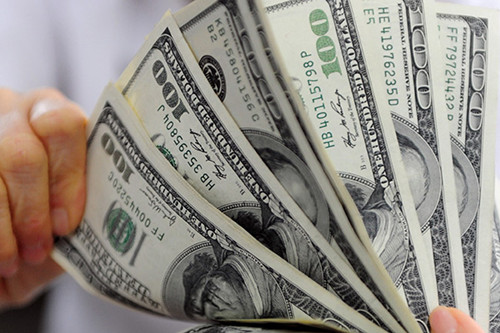China reduces US debt holdings


A teller counts and arranges dollar notes at an Agricultural Bank of China branch in Qionghai, South China's Hainan province. [Photo/China Daily]
Regulator says decision based on prevailing market situation
China reduced its holdings of US treasuries to a seven-month low in January, amid concerns that the world's largest bond market might suffer headwinds from impending interest rate increases.
The total amount of US treasuries held by China dropped to $1.17 trillion in January, compared with $1.18 trillion a month earlier, the US Treasury Department said in data released on Thursday.
It is the lowest level since July although China still remains the largest holder of US debt.
The total US treasuries held by all foreign investors shrank to $6.26 trillion, the lowest level in three months, down from a record-high $6.32 trillion in October, the US Treasury said.
The market expectation of US rate hikes and rising inflation has suppressed the US treasuries' value, especially for the long-term ones, said analysts.
The 10-year US treasury's yield increased to 2.82 percent on Friday compared with 2.4 percent at the end of last year, according to the Treasury data.
It also stimulated foreign holders' total net sales of US corporate bonds to $2.2 billion in January, up from the $1.3 billion a month earlier, said the US Treasury.
A statement issued by the State Administration of Foreign Exchange, China's foreign exchange regulator, on Jan 11 denied that it has "deliberately slowed down or suspended" an increase in US Treasury bond holdings, saying any decision made on US treasury investment is based on evaluating the market situation.
The SAFE has pledged to take professional measures to manage investments of the world's largest foreign exchange reserves, which hit $3.13 trillion by February, down by $27 billion from January, according to official data.
Pan Gongsheng, the SAFE director and vice-governor of the People's Bank of China, the central bank, in February affirmed the foreign exchange reserve's function as ensuring external payment, stabilizing foreign exchange rates and securing the national economic and financial safety.
"The investment should increase or at least retain the reserve's value, while optimizing its currency and asset structures," said Pan, who also stressed supporting the Belt and Road Initiative and promoting international cooperation on production capacity and equipment manufacturing.
Lukman Otunuga, research analyst at Forex-Time, an international forex broker specializing in forex trading, said that the US is seeking to impose additional tariffs on Chinese imports and this could weigh heavily on investor sentiment.
In addition, Wall Street remains vulnerable to further losses.
That concern may further restrain investment into the US bond market, said analysts.
MOST POPULAR
- 1 $39.7 billion worth of deals inked at Airshow China
- 2 China announces tax relief measures to stabilize real estate sector
- 3 A look at China's economy in October, 2024
- 4 Public holiday extension announced
- 5 China's NEV annual production hits 10 million milestone amid global carbon reduction efforts
Editors' Picks
 Infographic:
Golden jubilee of China-Brazil relations
Infographic:
Golden jubilee of China-Brazil relations
 Infographic:
A look at China's economy in October 2024
Infographic:
A look at China's economy in October 2024





